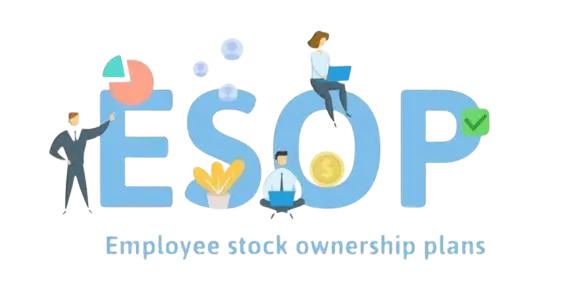ESOP stands for Employee Stock Option Plan. It is a form of benefit program for employees that enables them to hold stock in the business they work for. Employee stock ownership plans (ESOPs) are created to provide staff members and key managerial persons with a stake in the business. These plans can be utilized as a retirement benefit or to encourage and retain staff. As they provide a number of advantages, enhanced employee loyalty and incentive, and greater flexibility in managing ownership and control of the company, ESOPs can be a desirable alternative for both employers and employees.
What are the benefits of an Employee Stock Option Plan?
An Employee Stock Option Plan (ESOP) is highly beneficial for both companies and employees. Companies that have well-designed ESOPs are likely to be more productive, and profitable and experience lower employee turnover rates, as employees have a sense of ownership. The significance of ESOPs for employees and the company are:
For employees:
- Employees can take part in the company's success over time.
- Shares are usually provided at a predetermined price ( at a discounted price), and employees can benefit by selling the shares in the future at a fair value.
- ESOPs can be a great motivator for employees, enabling them to grow to new levels.
For the company:
- An ESOP can boost employee morale and encourage them to perform better.
- It can increase employee retention and lower turnover rates.
- ESOPs can help a private limited company save on remuneration to directors or key managerial persons by offering a certain portion of ESOPs instead of salary.
- Companies can replace cash compensation as rewards by offering ESOPs and can better control cash flows..
Under ESOP We Cover
How do we help?
1
Feasibility Study:
- The first step in ESOP planning is conducting a feasibility study.
- The feasibility study evaluates whether an ESOP is suitable for the company.
- This involves analyzing the company's financials, ownership structure, and other relevant factors including and not limited to aligning Company’s and Employee’s goals with such scheme.
2
Plan Design:
- If an ESOP is considered suitable, the next step is to design a plan that aligns with the company's goals and objectives.
- This involves deciding on the percentage of company stock to be allocated to the ESOP Pool.
- It also involves creating a vesting schedule that determines when employees become eligible to receive ownership in the company.
3
Valuation:
- Company stock must be valued to determine the Fair Value of the stocks so as to determine the exercise price for employees.
- A third-party valuation expert is involved in the valuation process.
- The expert assesses the company's financial performance, assets, and liabilities to determine the fair market value of the stock.
4
Legal Documentation:
- After the ESOP plan is designed and stock is valued, legal documents must be prepared.
- These documents include the ESOP trust agreement (if required), option purchase agreement, and plan document.
- These documents outline the terms and conditions of the ESOP plan, the purchase and sale of company stock, and the rights and responsibilities of the parties involved.
5
Communication and Education:
- Employees must be informed about the ESOP plan and educated on its value.
- This involves communicating the plan details, including the percentage of company stock allocated to the plan and the vesting schedule.
- It also involves helping employees understand their ownership stake in the company and the potential benefits of the ESOP plan along with tax implications.
6
Implementation:
- The ESOP plan is placed before the Board of the Company and Shareholders for Approval.
- Executing ESOP agreements with employees and handing over grant letters.
- Shares are then issued to eligible employees according to the vesting schedule.
7
Ongoing Compliance and Monitoring:
- Compliance with relevant laws and regulations must be monitored to ensure the ESOP plan is legally compliant.
- The ESOP plan must be periodically reviewed to ensure it aligns with the company's goals and objectives.
- This includes assessing the plan's performance, making any necessary updates, and ensuring it remains competitive in the marketplace.
8
Plan Termination:
- If the company decides to terminate the ESOP plan, the process involves buying back the stock from the ESOP.
- The stock is then distributed to eligible employees or sold to a third party if the company is being sold.
- The termination process must also comply with relevant laws and regulations to ensure a smooth and legal process.
Overall, ESOP services are designed to help companies establish and maintain effective employee ownership plans that benefit both the company and its employees. The process involves careful planning, design, implementation, and ongoing support to ensure the plan's long-term success.
Applicability

Startups:
ESOPs are a popular way for startups and are widely accepted in the startup ecosystem to attract and retain talent, as they allow employees to share in the company's growth and success and to monetize on high-valuation deals.

Established companies:
ESOPs can be used by established companies to provide incentives to employees and align their interests with those of the company's shareholders.

Mergers and acquisitions:
ESOPs can be used as a financing tool in mergers and acquisitions, allowing the acquiring company to pay for the target company in part with shares of its own stock.

Tax planning:
ESOPs can provide tax benefits to both the company and the employees, such as tax deductions for the company and tax deferral for the employees.

Corporate restructuring:
ESOPs can be used as a tool for corporate restructurings, such as spin-offs or divestitures, allowing the company to realign its assets and focus on core business activities.

Employee retention:
ESOPs can be used to incentivize employees to stay with the company for a longer period of time, as the value of their ownership stake in the company will increase over time.
Overall, ESOPs can be a powerful tool for companies to attract and retain talent, align employee interests with those of the company's shareholders, and provide tax benefits and financing opportunities.
Our Approach
1
Experience and expertise:
A provider with extensive experience and expertise in ESOP planning, implementation, and compliance can offer valuable insights and guidance.
2
Customized solutions:
A provider who takes the time to understand the company's specific goals and objectives can design a customized ESOP plan that meets those needs.
3
Legal and regulatory compliance:
A provider who stays up-to-date with the latest laws and regulations can ensure the ESOP plan is in compliance with all applicable requirements.
4
Trust and transparency:
A provider who is transparent and trustworthy can foster a positive working relationship with the company and help ensure the success of the ESOP plan.
5
Expertise in complex financial areas:
Our team has deep expertise in complex financial areas such as FEMA Compliance, Transfer Pricing, Business Valuation, ESOPs, and Internal Audit.
Kpis To Measure The Service Quality

Costs
- Actual vs. budget costs.
- Budget needed for completion vs. budget remaining

Team Productivity
- Lead time and Cycle time.
- Team Velocity
- Deployment frequency
- Time spent vs. time planned (for iteracions or implementation of partic features)

Customer Involvement
- Time spent by a customer's employees fulfiling a vendor's requests
- Time of delays with requirements elicitation sessions on the customer’s side

User Satisfaction
- Overall customer satisfaction score
- The team's proactivity (problem-solving Skills, ability to give advice)
- The team's reliability (fulfilment of promises)
- The team's responsiveness (including availability)
MMA ESOP Service - Q&A
-

What services do you provide for ESOPs?
A: Our company provides a range of ESOP services, including feasibility studies, plan design, stock valuations, legal document drafting, employee communication and education, compliance monitoring, and plan termination assistance.
-

How does a feasibility study work?
A: A feasibility study analyzes the company's financials, ownership structure, and other factors to determine if an ESOP is a good fit for the company.
-

How do you determine the stock price for the ESOP?
A: The company's stock is typically valued by a third-party valuation expert, who will assess the company's financial performance, assets, and liabilities.
-

How long does it take to implement an ESOP?
A: The timeline for implementing an ESOP can vary depending on the complexity of the plan and the company's specific needs. However, it typically takes 3-4 months to complete the process.
-

How do you ensure compliance with ESOP regulations?
A: Our company stays up-to-date with the latest laws and regulations to ensure the ESOP plan is in compliance. We also provide ongoing compliance monitoring and assistance.






